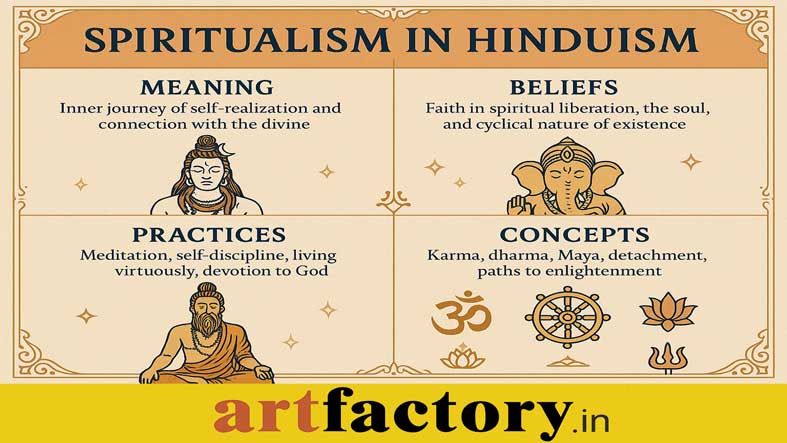
Spiritualism in Hinduism: Meaning, Beliefs, Practices, and Concepts
Spiritualism is not just a belief system—it’s a way of life that seeks deeper connection with the universe, the self, and the divine. In the context of Hinduism, spiritualism is richly layered with centuries of wisdom, rituals, and introspection. In this blog, we will explore the meaning of spiritualism, core spiritual beliefs, daily practices, and foundational spiritual concepts that define the Hindu path to higher consciousness.
What is Spiritualism in Hinduism?
Spiritualism in Hinduism means realizing the true nature of the self (Atman) and its unity with the ultimate reality (Brahman). Unlike materialism, which is rooted in sensory pleasure, spiritualism emphasizes inner peace, soul growth, and liberation (Moksha).
Key Aspects of Hindu Spiritualism:
Self-realization: Understanding that the soul is eternal and divine.
Karma: Every action has consequences; good karma leads to spiritual evolution.
Rebirth and Liberation: The cycle of birth and rebirth (Samsara) continues until the soul attains Moksha.
Dharma: Living in alignment with moral duty and righteousness.
Core Spiritual Beliefs in Hinduism
Atman is Brahman: The soul (Atman) is not separate from God (Brahman).
Law of Karma: Actions dictate destiny. Spiritual growth is fueled by selfless actions.
Reincarnation: The soul takes birth multiple times until it is freed.
Moksha: Ultimate spiritual goal; liberation from the cycle of rebirth.
Unity in Diversity: All paths—devotion (Bhakti), knowledge (Jnana), action (Karma)—lead to the divine.
Spiritual Practices in Hinduism
Daily spiritual practices in Hinduism are designed to purify the mind and bring the devotee closer to the divine.
Common Practices:
Meditation (Dhyana): Connecting with the inner self.
Chanting Mantras: Repeating sacred sounds like Om, Gayatri Mantra, or Hare Krishna.
Puja (Worship): Offering flowers, incense, and devotion to deities.
Yoga: A holistic spiritual discipline encompassing physical postures, breath control, and inner awareness.
Pilgrimage: Visiting sacred temples and holy sites like Varanasi, Rameshwaram, Kedarnath, etc.
Fasting (Upvas): Purifying the body and mind to enhance spiritual clarity.
Spiritual Concepts in Hinduism
1. Atman: The individual soul, eternal and pure.
2. Brahman: The supreme cosmic consciousness, the source of all creation.
3. Maya: The illusion that veils the truth of existence.
4. Moksha: Liberation from the material world and union with the divine.
5. Guru: A spiritual teacher who guides seekers toward truth.
These concepts form the philosophical foundation of Hindu spiritual life and are expounded in scriptures like the Upanishads, Bhagavad Gita, and Vedas.
Real-Life Examples of Hindu Spiritualism
Swami Vivekananda: Focused on universal consciousness, service to humanity, and the unity of all religions.
Ramakrishna Paramahamsa: Attained spiritual realization through different paths—devotion, knowledge, and Tantra.
Neem Karoli Baba: Practiced unconditional love and mantra chanting, inspiring thousands worldwide.
These saints exemplified how spiritualism in Hinduism transcends religion and becomes a universal truth.
FAQs About Spiritualism in Hinduism
Q1: Is spiritualism and religion the same in Hinduism?
A: Not exactly. Hinduism views religion as a path and spiritualism as the goal. One can be spiritual without being religious in a traditional sense.
Q2: Can anyone practice Hindu spiritualism?
A: Yes. Hindu spiritualism is inclusive. One does not need to be born Hindu; practicing truth, compassion, and self-awareness is enough.
Q3: What is the role of a Guru in spiritual practice?
A: A Guru acts as a light in the darkness, guiding the seeker through the complexities of the spiritual path.
Q4: Is Moksha achievable in one lifetime?
A: Yes, through intense devotion, self-inquiry, and surrender, one can attain liberation in this very life.
Final Thoughts
Hindu spiritualism offers a holistic, time-tested framework for anyone seeking inner peace, purpose, and connection with the divine. Whether through meditation, service, or chanting, each soul can move closer to its divine origin.
Start your journey today — not by seeking outside, but by looking within.
For Spiritual Painting click here

Comments : (0)